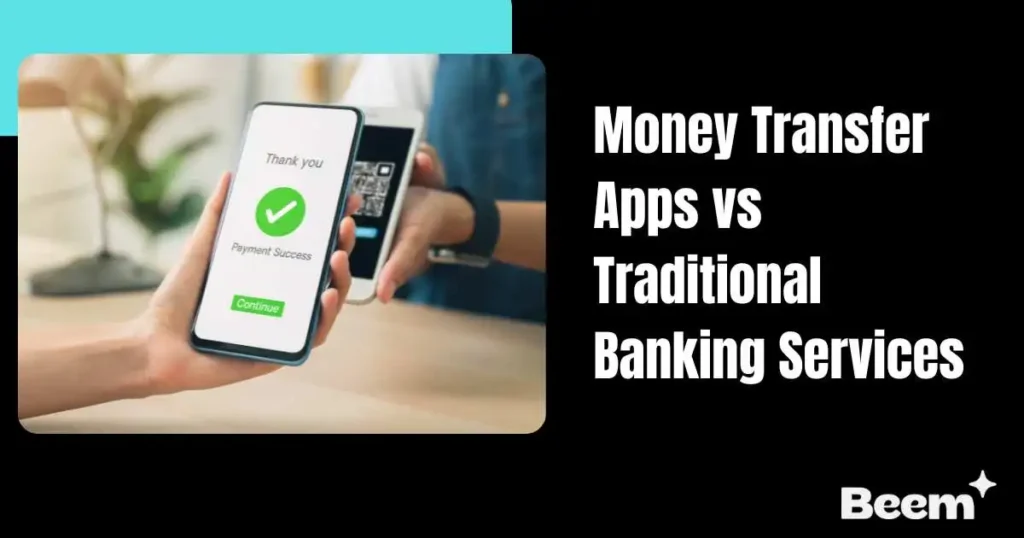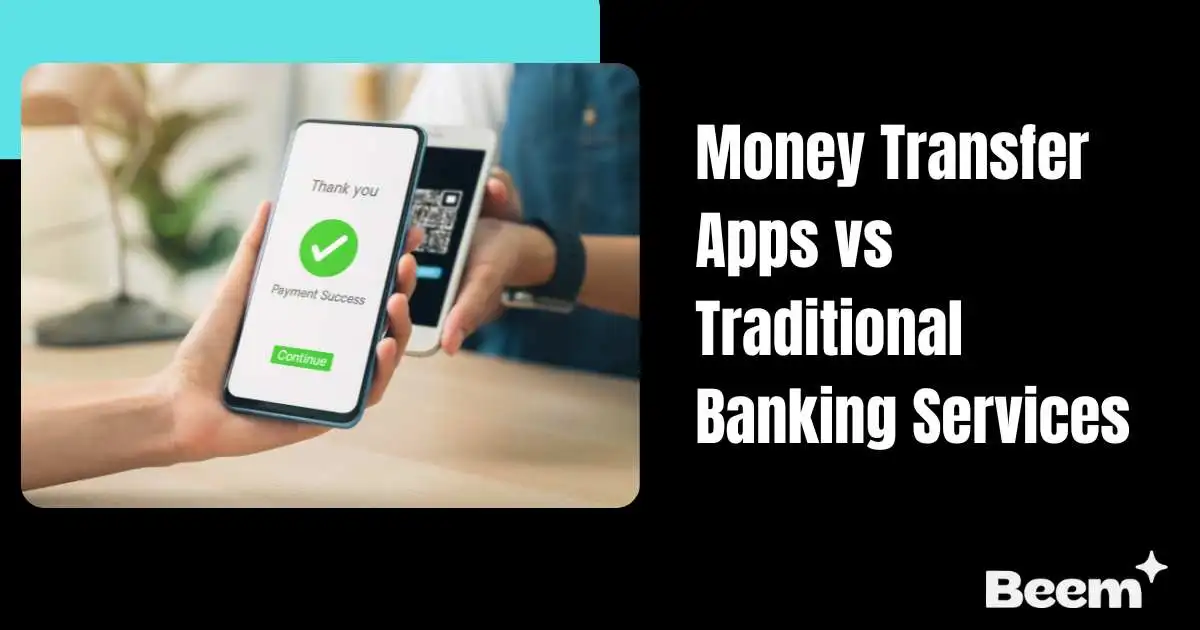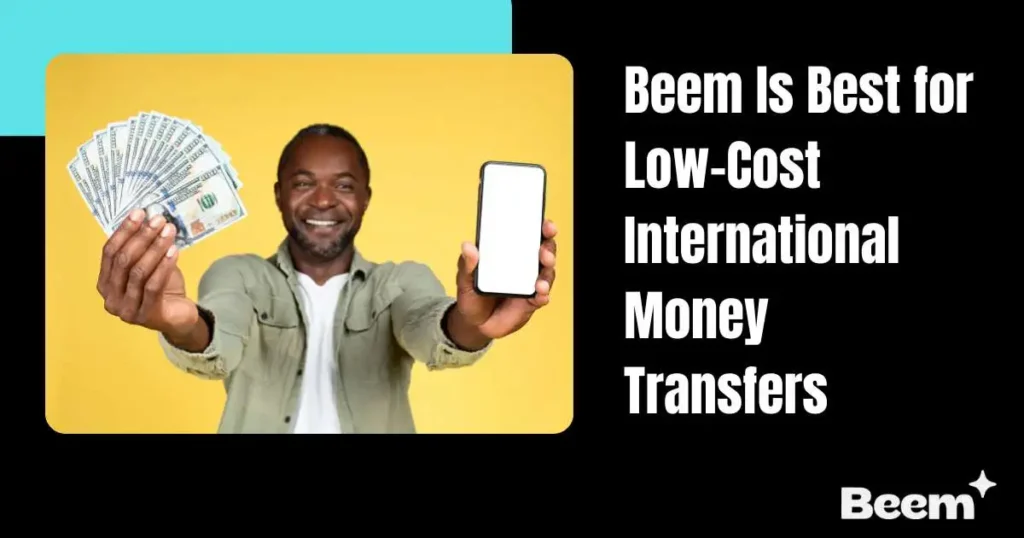At A Glance
Selecting where to send money today isn’t only about ease—it’s also about trust. Are money transfer apps more reliable? With digital technology transforming how we send money, most of us wonder: Is it safer to use mobile apps than traditional ways?
This guide compares the most popular money transfer apps, such as Wise, PayPal, Remitly, and Cash App, with traditional methods like bank wire transfers and remittance services like Western Union. We’ll examine where they excel or fall short in speed, price, security, and availability—so you can determine which one deserves your trust.
With apps like Beem, which offer fast, secure, and low-cost options, money transfers have never been easier. Whether you’re sending emergency funds or routine support, Beem ensures your money reaches loved ones instantly—no bank visits or paperwork needed.
1. What Counts as “Reliable”?
Regarding sending money, reliability is not so much about the work being done—it’s about consistently doing it. This is what truly matters:
- On-Time Transfer of Funds: A reliable service ensures that the recipient receives the money within the specified time limit. Delays can be quite upsetting, especially when it comes to necessary payments, such as rent, tuition, or other bills.
- Accurate Currency Conversion and Processing: Reputable platforms convert currency clearly and use reasonable exchange rates.They transfer the exact amount quoted, with minimal rounding differences and without unexpected deductions.
- Low Chances of Failure, Fraud, or Misrouting: Good services have robust security measures that safeguard against technical glitches, hacker attacks, or sending your money to the wrong account. Your funds should be traceable and safeguarded throughout the entire process.
- Responsive Customer Care: Even with the best systems, things can always go wrong. A good provider offers quick and friendly support when you need to know or require assistance. You should be heard and supported through chat, email, or phone.
In short, a “reliable” money transfer service provides speed, accuracy, security, and support under one umbrella.

2. Overview: Traditional vs. App-Based Money Transfers
When transferring money internationally or even within your own country, you typically have two options: traditional and money transfer apps, both of which have advantages and disadvantages.
a. Traditional Services
These are bank wire transfers, the SWIFT system, and in-person services like Western Union or MoneyGram. These options are usually considered institutionally secure and trusted because they are famous for their established history.
Nevertheless, they are usually slower, particularly for cross-border transactions, and may have higher fees or less favorable exchange rates. Paperwork, branch visits, and manual handling contribute to the delay.
b. Money Transfer Apps
Modern options such as Wise, PayPal, Remitly, Revolut, and WorldRemit are based entirely online using websites or mobile applications. They provide immediate monitoring, notifications, and faster transfers, typically in hours or minutes. Additionally, they provide greater clarity regarding costs and conversion rates, which is advantageous for those who value convenience, speed, and control via mobile devices.
In simple terms, applications provide flexibility, cost savings, and user experience, whereas traditional methods offer institutional familiarity.
Also Read: How To Get Started With Instant Money Transfers Across Borders From The USA
3. Speed and Convenience
Apps
Online services such as Wise, Remitly, and PayPal are designed for convenience and speed. Depending on the recipient and payment type, transfers are made instantly or on the same day. The apps are available 24/7, so you can send money at any time of the day or night without waiting for a bank to open.
They also offer real-time monitoring and push notifications, so you will never be in the dark about the status of your transfer. From initial setup to confirmation, it is all possible within minutes with just your smartphone or computer—no forms, no waiting lines.
Traditional Services
Traditional methods, such as walk-in services like Western Union or bank wire transfers, often have processing delays that range from one to five business days for international transfers. Different time zones, verification procedures, and intermediate banks are some of the reasons for the delays.
A visit to a physical branch is also necessary for in-person transfers, which may involve waiting in line, completing paperwork, and adhering to strict office hours. This might be annoying for those with demanding requirements or busy schedules.
Verdict: Apps win for speed and user experience
In terms of speed and ease, money transfer apps win. They provide faster processing, easy access, and a user experience—all necessary features in the digital world today.
4. Fees and Exchange Rates
Apps
One of the most significant benefits of digital apps is that they are transparent regarding pricing. Transfers such as Wise, Remitly, and WorldRemit all notify you of the precise fee before you accept the transfer. More notably, however, they utilize the real-time mid-market exchange rate—the same rate that appears on Google—so you understand you’re not losing money to clandestine markups.
Apps also break down the total cost into transfer fee, exchange rate, and delivery time—all displayed upfront. This allows for easier comparison and selection according to your budget.
Traditional Services
Conversely, both traditional wire services and banks tend to have hidden fees. Most banks and money transfer operators charge exchange rate markups, offering a subpar rate compared to the market, to take a rebate quietly. Additionally, middleman banks have the ability to charge their fees midway through the transfer, and these charges are often not communicated at the outset.
You may believe you are paying a fixed charge, only to discover that the recipient receives less than intended because of mysterious deductions.
Verdict: Apps are more cost-transparent and budget-friendly
Apps win based on affordability and pricing transparency. There are no unpleasant surprises because you can see how much you’ll pay, what the payee gets, and side-by-side comparisons.
5. Security and Regulation
Both Are Secure, but Vary by Provider
Both money transfer apps and traditional banks adhere to rigorous security and regulatory standards, but their methodologies differ.
Platforms like Wise, PayPal, and Revolut are regulated and licensed by leading financial authorities, including the Financial Conduct Authority (FCA) in the UK, the Financial Crimes Enforcement Network (FinCEN) in the U.S., and local equivalents in other markets.
They implement bank-grade encryption, two-factor authentication (2FA), biometric logins, and real-time fraud detection and prevention. The outcome? The user enjoys a high degree of control and visibility.
Traditional banks also have robust security systems, such as encrypted wire networks, internal audits, and multi-layered fraud checks. Their legacy systems within institutions have been proven over the decades. Banks are also slower to adopt newer, user-friendly technology and may not provide immediate alerts or adaptive dispute resolution tools via mobile applications.
Risk Notes
Apps can briefly hold or freeze transactions when fraud is suspected. PayPal may temporarily freeze funds or flag accounts when suspected activity is detected, even if the transfer is legitimate. While this adds a layer of security, it can sometimes result in frustrating delays.
On the other hand, banks may require more effort to resolve disputes or return money, often involving in-person meetings or extensive documentation.
Verdict: Both secure, but apps offer more proactive security features for users
Both choices are safe, but apps provide more active, user-focused security options, such as instant fraud notification, biometric login, and improved mobile integration. Traditional banks offer deep-seated security but may fall behind in convenience and speed.
Also Read: Start Sending Money Globally: A Step-by-Step Guide for US Residents
6. Accessibility and Global Reach
Apps
Contemporary money transfer apps are designed with worldwide accessibility in mind. Many are compatible with mobile wallets and local financial instruments such as M-Pesa (Africa), GCash (Philippines), and Paytm (India), meaning that recipients can access money without a conventional bank account.
This makes them perfectly suitable for the unbanked or underbanked, migrant laborers, or those in rural places. With only a smartphone and an internet connection, customers can send and receive money instantly, wherever they are.
Apps also support various local languages and currencies, making them friendlier in mixed regions.
Traditional Services
Bank wires typically require both parties to have active bank accounts, which can be a barrier for those without formal banking status. Recipients for cash pickup arrangements through agencies such as Western Union are restricted to particular branch locations and must call during business hours, which can prove limiting.
Specific rural or low-income neighborhoods may also lack branch-based banking infrastructure, making it difficult to access.
Verdict: Apps are more inclusive and flexible
Apps are much more inclusive and versatile. They extend beyond narrower segments, are more compatible with local systems, and provide easier access to those outside the formal banking network.
7. Customer Support and User Experience
Apps
Apps are built on the principle of digital ease of use and convenience. All but two of them have in-app assistance, AI-based chatbots, and self-help centers available 24/7. Top apps like Wise, Remitly, and Revolut offer live chat or email support with relatively quick response times.
The interface is usually minimal and mobile-optimized. It steps users through transfers, tracking, and problem-solving, providing a seamless and intuitive process with minimal drag for tech-savvy users.
Traditional Services
Legacy banks and traditional money transfer services rely predominantly on phone support or in-person branch visits. This translates into lengthy waiting times, recirculation of information between departments, and limited solution options online.
Banks are trusted institutions, but their customer service infrastructure, especially that of Legacy banks, while trusted, often relies on more traditional support channels, which may not be as responsive for today’s digital-first users.
These also lack real-time tracking and self-help features, forcing users to call or visit to access their transaction status.
Verdict: Apps offer faster, more intuitive support, especially for digital natives
Apps decisively take the lead in customer experience. They offer speedier, more intuitive support channels designed for digital users, resulting in quicker and less painful navigation and issue resolution.
8. Use Case Comparisons
| Use Case | Best Option | Why |
| Emergency fund for family abroad | App (Remitly, Xoom) | Speed, mobile wallet compatibility |
| High-value international business payment | Bank transfer | Formality, documentation, and legal traceability |
| Regular small transfers | App (Wise, Revolut) | Lower cost, quick repeat transactions |
| Sending to someone without a bank account | App (GCash, M-Pesa via Remitly) | Bank-free solutions |
Conclusion: Money Transfer Apps vs Traditional Services
Money transfer apps have revolutionized the game by providing faster, cheaper, and more convenient services for most day-to-day and cross-border transactions. With real-time tracking, transparent fees, and 24/7 access, they offer more control and convenience than the traditional method.
However, the tradition still has its uses, particularly for large transactions or when paying recipients in cash-oriented regions is necessary. To select the best option, consider speed, expense, safety, and the ease with which your recipient can receive funds. Above all, always use a regulated and reputable platform to secure your money at every step.
With Beem, sending money is as simple as a few taps—there are no hidden fees or delays. Whether you’re helping out family or covering an urgent need, Beem’s Send Now, Pay Later™ feature lets you support loved ones instantly and settle up when it works for you.






